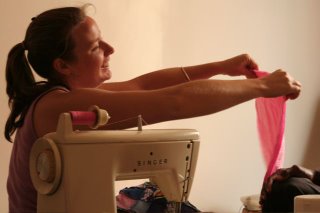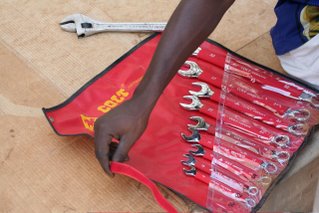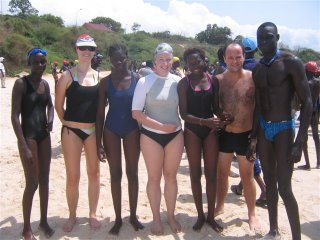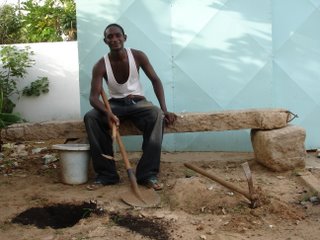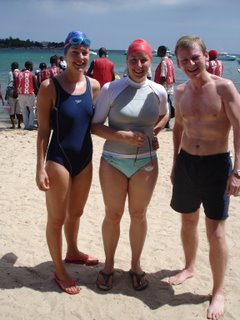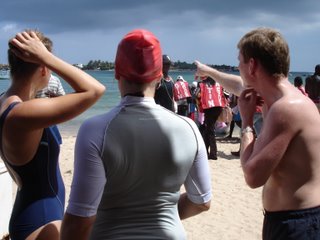
Last week there was a death. This week, a birth.
I’m secretly hoping they’ll name her after me but since I have only just got to grips with the mother’s name, Khady, it’s unlikely to happen. Tapha’s best friend, Ado, and his wife had a little girl yesterday morning. We went to visit them after dinner, at 11pm, and Ado was sitting outside his small house in Lindiane, practically in the forest on the edge of Ziguinchor, while Khady slept. We sat under the mango tree and shhhhhh-sh’d the dogs as they howled at eachother, and talked in Mandinka which I am now getting to grips with.
The next morning I went back to see the mother and baby. Khady was outside sweeping the mud patch infront of their one-room house, stoking the fire getting ready to cook lunch in a blackened pot. I asked her, through Tapha, is she shouldn’t be in bed resting. She had, after all, given birth just 24 hours before.
“There’s no one else here to help her!” laughed Tapha, without translating what I had said for her. So I asked her myself, in awkward Wolof, why she didn’t lie down. She shrugged her shoulders as if it were nothing. African women, I tell you, are strong.
Talking of naming, last night my family (the children of which are pictured) decided it was time I had a Senegalese name. One of the most special things that can happen to you here is that someone names their child after you. When you have their name, in some way you become them. So when Tapha sees the son of his name-sake, the man, older than him, calls Tapha ‘Father’. I have lasted five years without having to take on a Senegalese name, but about a year and a half ago, Tapha and I did do something in secret about my name so that when the time came I would be prepared. He gave me the choice of three names, one of which was his mother’s name, Siré. I said I would have it if he took my father’s name, Stephen (which cracks him up every time I say it).
Last night, the family were sitting outside in the compound, watching the TV through a door into the house. Mariam, Tapha’s older sister, was shelling white beans and his mother, Na Siré (Mother Siré), was picking the grit out of the rice. Papa was sitting smoking, wordless as ever.
“Why don’t you have a Senegalese name?” asked Mariam. “It’s time you had one. I’m going to sleep on it and in the morning, I’ll tell you what it is,” she joked.
Everyone joined in, calling out names to see what I responded to- Rokia, Rama, Aisha, Fatimata. I started to blush. Na Siré is a tough woman and I wasn’t sure how she would respond to the fact that I had taken her name. Also, I felt like a bit of a suck taking the mother’s name. I could have at least gone for a sister.
“There’s something you should all know,” said Tapha. “Rose has actually had a Senegalese name for a year and a half. Go on,” he prodded me, “Tell them what it is.”
I was racked with shyness so Tapha said it for me.
“Siré,” he said.
Before he had even finished the word, his mother, her head still bowed as she picked at the rice, said her surname, Sagna, without even looking up. There was rampant applause; it meant that she accepted and I was now, as much as we would ever be, like her.
“Siré,” said Papa.
“Sagna,” said Na Siré again, quickly.
She blushed and I think even tears came to her eyes. But perhaps as I would have done, she pretended it hadn’t touched her in the slightest and went on with the rice, her head, all wrapped up in a green cloth, bobbing in the low light.
I mentioned last time that I feel a certain element of spirituality missing from my life. Instead of bitching about it further, I decided I would do something about it and set out to find out what it is that makes Senegalese people tick.
I told Na Siré that I wanted to go and see a marabout. He is the spiritual guide, fortune-teller, healer, witch-doctor and everybody is afraid of him in some way, even if they don’t consult one. Supposedly he has the power to protect you from the evil spirits, by divining what it is you need and then writing out texts (from the Koran but also strange squiggles that look a little like maps) which you carry with you in the form of leather gri-gris. He also has the power to harm others, so it’s said, by setting the evil spirits on them, which is why you need your own marabout to protect you.
There are lots of things that people say aren’t right with the system of consulting a marabout for every ache and pain and desire for a job or a visa or the death of a neighbour’s livestock. The marabout are certainly unregulated and wield incredible power over people who don’t believe that they are in charge of their own destiny. They charge large amounts of money, often drive around in Mercedes (hence their nickname, ‘Mercedes Marabout’) while their followers struggle to get together enough for a meal, all the while promising to be able to do away with the evil spirit that’s making them poor.
They also prescribe muddy-looking water to sick people, meant to have healing powers if drunk or bathed in, and run Dakar’s music distribution network, public transport system and most big businesses. The president spent his first three days in power with his ministers at the feet of the country’s most powerful marabout, knowing full well that if he wants anything done here, then it has to happen through the marabout.
Well, of course I don’t believe in his powers. But then, it can’t hurt, right?
Na Siré gave us directions and Tapha and I went off on the motorbike, past the airport, down a little muddy road, past a mosque, past a vegetable patch where yam plants were starting to poke through the muddy soil and stopped outside a concrete house.
“Salaam aleikum” we cooed on entering the compound, and a young girl holding a straw broom showed us into the dark depths of the house.
A tiny baby chicken, the size of my fist, was narrowly avoided being trodden on as I stepped into a damp-smelling room and saw through a curtain to one side, an even darker, mud room. Again I said “salaam aleikum” and a voice told me to enter.
Inside was a tiny window, high-up, which looked out onto a pile of bricks less than a foot away. A metal bed, balancing on rocks to avoid it rocking on the uneven mud floor, stood to the left and a middle-aged man wearing a soft cotton boubou sat on a mat on the floor. Beside him was a copy of the Qur’an, some wooden prayer beads and a mat with a picture of the mosque at Mecca woven on it. He invited Tapha and I to sit down, which we did on the free part of the mat.
They started to speak in Mandinka, Tapha explaining that I was a friend who needed some protection while I lived and worked far from my family and felt particularly unstable at this time. I listened, and observed this holy-man, who was round-faced, wrinkled, and sat with one knee up, the other underneath him. They continued talking, and eventually the man pulled out a leather wallet in which were hundreds of dog-eared bits of paper with Arabic writing on them, as well as diagrams and drawings all done in black felt-tip pen. He leafed through them, eventually pulling one out and laying it on the mat.
The man asked me to think about what it was I really wanted and when I was done, to reach forward and pick up the prayer beads by one of the single beads, and hand it to him. I did so, asking that I find stability in my life in Senegal, particularly with regards to work. He took the beads, counted them and then consulted his paper.
He told me, through Tapha, that I must have a lot of dreams at night and that if I just relaxed a bit and was patient, everything would come to me. He said also that there were many people around me who wanted to use me for my ideas or to learn things, and that I needed to be protected against these people. He also said that since I was a foreigner travelling a lot, I should have some protection against bullets and natural disasters.
He told me to come back the next day and collect my ‘prescription’. On the iddue of money, because I am Na Siré’s daughter, he said, he wouldn’t charge me. But I should donate the equivalent of £10 to him, for good luck. I bargained him down to £5 and we were on our way.
The next day we went to pick up my gri-gris. We took them down to the market, three pieces of paper with Arabic and squiggles on it in the familiar black felt-tip pen, to the gri-gri maker camped out under a tin awning with his tools beside him. He is essentially a leather-worker, wrapping the pieces of paper in plastic and then binding them in leather, attaching them to piece of black string (which Tapha was dispatched to buy from the boutique) which are then tied around the waist.
For three hours we sat watching him binding and sewing, eventually by candlelight. In that time an old Joola lady came along selling mangoes, of which I bought four the size of my head to take back to Dakar, the gri-gri maker’s young son appeared, knocked over the candle and called me ‘toubab’ over and over again and I was bitten by a flock of muto-muto, a smaller and much more vicious mosquito who made a feast of my foot.
But much later, we did appear with my three gri-gris. I am now wearing them around my waist.
I suppose what I came to understand about Senegalese people from this brief foray into the mystic is that their spirituality, like everything else, is about today. It’s not about how one’s actions will effect them in the after-life, or the next life, but how the spirits rule and control the things going on now- crops, jobs, family, love, health. It’s a system based on fear- that the job is not to aim for good but to avoid evil.
As one clever reader commented on my last entry, I say that the Senegalese have no sense of the future; but maybe we Europeans have no sense of the present. I guess I’m looking for a balance.



